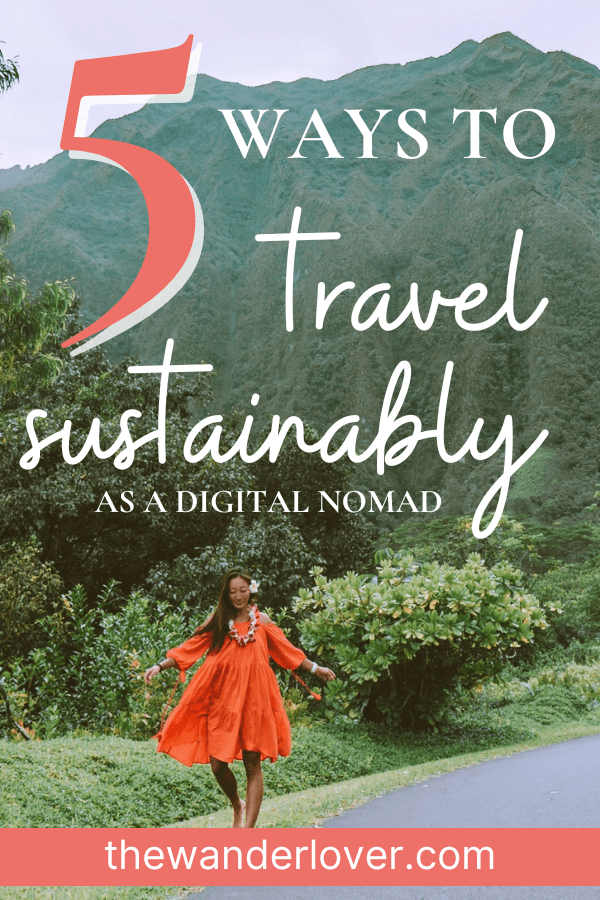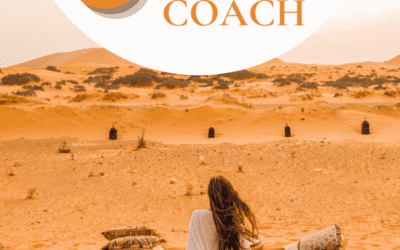Sustainable travel or sustainable tourism can feel like a bit of a buzz word recently, but as someone that has been traveling full time for the past 6+ years I have learned and seen a lot about how mass tourism impacts countries and communities. It’s an important conversation to have now more than ever, and you can make a difference. These are my tips!
Quick Links
✧ Join the Digital Nomad Society for Just $7/Month
✧ Follow The Wanderlover Podcast on Instagram
Prefer to read? Here’s the blog version…
Bali & The Effects of Mass Tourism
Hi guys! Welcome back to the Wanderlover Podcast. I am recording this episode from Bali, Indonesia and I felt very called to do an entire episode on sustainable travel and tourism because of how exceptionally fast tourism and development is happening in Bali — and in my opinion, negatively.
So I just want to bring to everyone’s attention that whenever you travel, you have the power to do it in a sustainable way.
From my experience, I first visited Bali in 2018 and I fell in love with it. After it’s gone through COVID and just so much investment, and just so many things going on, a lot of money is being funneled onto this island in a very unsustainable way and it’s negatively impacting the local community. It’s negatively impacting people’s experiences here and for me, why I fell in love with this island in the first place.
It’s so easy to just follow the status quo of what everyone else is doing, how everyone else is traveling, but I feel like in this day and age where we have so much power over our actions and so many ways to spend our money and invest our money, I want to share with you Five Ways to Travel Sustainably as a Digital Nomad, and in turn be able to collectively tackle unsustainable tourism, to speak out against it, and also act out against it.
Disclaimer: I am by no means an expert on this subject, but I am very aware and I have done my research. I do make an effort everywhere I go to travel sustainably and get better every day. And so I just want to share with you what’s been working for me and how you can reframe your travels in a way that benefits everyone around you.
What Is Sustainable Tourism?
Sustainable tourism is tourism that takes full account of its current and future economic, social, and environmental impacts, addressing the needs of visitors, the industry, the environment, and host communities. Basically, in areas of the world where travel and tourism is popular, we want to navigate the transactions and the actions of tourists in order to benefit everyone involved – not just for the sake of tourism, of bringing in more money, but also how does the money then get redistributed inside the economy?
Who are you supporting? Is the environment being affected? If loads and loads more of tourists come in, is there enough infrastructure? Is it all sustainable or are we just killing the environment and the communities we are entering?
What’s really interesting is that some places they thrive and rely on tourism, but the infrastructure and the laws aren’t there to support mass influxes of money and development. So over time, you can really see the negative impact it has on the local communities and on societies as a whole.
I’m very, very privileged and grateful to be able to speak on this subject matter because I feel like I’ve been able to revisit places over the past 10- 15 years and really see how it has changed. The first time you visit somewhere, it’s kind of like your status quo. You might meet people that tell you, oh, 10 years ago it was like this, 20 years ago it was like this and 50 years ago, back in the day etc. But for you, in your experience, that is what you hold as a status quo and every time you revisit, you can see how things have changed.
For example, every time I go back to New York, there’s new businesses, there’s new restaurants, but all in all, it’s similar. I don’t feel like I’m entering a completely different New York, the energy is still there, the basic structure is still there. There may be new establishments, but I don’t feel like it’s changed that much.
I cannot say the same about other places around the world that I’ve been to recently. Places like Puerto Escondido, places like Bali, symptoms of how it’s already kind of like cracking at the seams. There is sewage, just lots and lots of sewage in the water because there simply is no waste management system in place to support all of these new giant beach clubs running all along the coast now because of all of the festivals and parties that foreigners want to throw on this little island. There are super clubs and hotel chains and because of this, all of the locals are being forced out of their homes further upwards or inland because they simply cannot compete with all of the money coming in.
It’s of course two-sided because if you grow up a certain way in this community and all of a sudden people are offering you like hundreds of thousands of dollars or millions of dollars for your land. It’s going to be hard to say no, but my intention with this episode is for every traveler, if you love traveling, I really implore you to do things and communicate in a way that benefits everyone.
5 Ways to Travel Sustainably as a Digital Nomad
1. Travel Slower
As a Digital Nomad, this is a luxury that you are capable of using to your advantage while benefiting everyone else. if you stay in one location for a longer period of time and move away from the vacation style traveling, you fly less, you take less flights and therefore you reduce CO2 emissions. Air travel is one of the most unsustainable ways of traveling, so the less you can fly, the better and the less frequently you fly the better.
If you are able to work from anywhere, not only are you flying less, but you get to integrate with the local community better. You get to learn the language and you really get to develop relationships, not just superficial transactional relationships with locals while on vacation, but you get to truly be a part of their community. You can volunteer, you can meet their families, and you can find more sustainable ways of traveling like carpooling or you know, having friends to then go places together. You are more like someone living there rather than just being a tourist coming in and out.
2. Support Local
The second way to travel more sustainably is to eat local food, support local businesses, and shop local. In any tourist destination, you can clearly see which businesses are catered towards tourists and make kind of like the tourist income and revenue, which is great. But then you’ll also see that there are local restaurants, local shops that cater specifically to locals, and it’s really important that you support those businesses too. Oftentimes those are the ones that don’t speak English that you know are really excited to see a foreigner visit their establishments.
But what this means is oftentimes these are the first people to get pushed off or kicked out when foreign investment takes over because they’re not charging those incredibly high prices to sustain that. And so when you can energetically invest your time, your energy and money to support those small local businesses.
This holds true for local villas or homestays or local shops. They’re not going to be on Google Maps or Airbnb or Booking.com. So make sure that when you are spending your money, try to support the local families and community and if you can try to go straight to the source, bypass Airbnb and Booking.com when you can.
This is also easier if you are planning to stay for an extended period of time because you can actually go around and knock on their doors and talk to people one-on-one, instead of having to go through a third party. A lot of the times tour operators or online platforms, they take a huge chunk of commission and it doesn’t go back into the local economy at all.
Of course, there is a convenience factor involved and that is why they’re able to take a percentage, but when you can, I implore you to find ways where you can go directly to the source or the person offering the product or service.
3. Leave No Trace
The third way to travel sustainably as a Digital Nomad is to leave your environment with no trace as if you haven’t been there. I see people who collect seashells or they’re like breaking up rocks or pulling flowers off of trees and it just makes me cringe a little because of course there’s no ill intention, a lot of times it’s completely harmless. But imagine if everyone did that, right? Like imagine if everyone who’s visiting just took a bottle of sand from the beaches of Waikiki or something like that, right?
Don’t try to disturb the environment and leave it as you came. If there is an opportunity to improve the environment, then take it. A lot of times I will be picking up trash that’s washed up on the beach or Ragz will go diving for trash that’s on the bottom of the ocean floor. If it’s possible, try to clean up after yourself after the environment and don’t contribute to the mess there.
In Bali, it is insane how much trash is around, and I do feel like it’s just something that’s not taught in schools, and it can be really tempting to just add to it because there’s already so much.
But as a sustainable traveler, you want to be improving the environment and at a bare minimum, you want to be leaving the environment alone. This is so important because oftentimes it’s what gets you to a place in the first place, right? Like the beautiful beaches, the beautiful jungles, the nature. Let’s preserve all of that instead of destroying it.
4. Don’t Start Businesses In Foreign Countries
This is going to be quite controversial depending on what your values and ethos are. But what I have is do not start businesses in other countries that you do not align with. I want you to be a part of the solution, not the problem. As I said before, in places like Puerto Escondido and many parts of Mexico and many parts of Indonesia, there are so many foreigners investing so much money into these islands. Building, selling, setting up businesses, competing with the local market, and the returns can be great. It’s very lucrative. The islands, the tourism is developing really fast. But you have to ask yourself at what expense, at the rate at which everything is going. Is this something you want to be involved in? Do you wanna invest your time and money into a system like this?
And many people, to each their own, if they see a great investment, they will hop on it and that is completely fine, if they see nothing wrong with it. I’ve spoken to people here who are like, well, somebody’s got to invest or exploit. If I’m not gonna do it, then someone else will. So might as well be part of it and reap the rewards in a sense. And I just personally don’t align with it.
And so I’m going to advise you to not start businesses that don’t align with your values. If you have to exploit third worlds or any worlds countries or exploit any people’s for your benefit, that is something that should trigger something.
It should be like, no, I can take my money somewhere else, or I can use it in a wiser, more beneficial way. Trying to kind of revamp the system rather than contributing to the problem. I think money is so powerful and it should be used to expand what you believe in and energetically what you wanna see more of in this world, whether or not you’re making great returns. If it’s a faulty system, if it’s a faulty business model, it’s not going to be worth it in the long run. You want to make sure you’re planting your roots somewhere with very fertile, ethical and strong healthy soil.
5. Spread The Sustainable Travel Message
Which brings me to my last way to travel sustainably, is to spread the word of how others can do it too. Use your voice, use your platform, and show them how it’s done. Use what I’ve said in this episode, make it your own, and spread the word about how important sustainable travel and tourism is.
Set an example and also speak out when you feel like something is wrong. Speak out when you feel like you can change someone else’s actions or if they don’t see what they’re doing wrong. You have the power to be a catalyst for change, and if this is something that you want to invite more of into your life, know that you can use your voice to speak out.
It’s not going to be overnight and it’s not going to be easy. But I do think if you choose to align your actions with what you believe in, invest your money wisely, give back in a way that is beneficial to everyone involved. That is just such a beautiful experience that you get through traveling, through meeting other people. It truly reminds us of how incredible the world and humans around the world are.
I will see you guys in Rote Island next week where I will also be able to see how much it’s changed since I’ve last been there in 2021. Have an amazing week, guys! Sending you so much love.

If you’ve enjoyed this episode, it would mean so much if you could leave a review on Apple Podcasts. This helps us spread The Wanderlover mission to those who need a dose of inspiration today.











